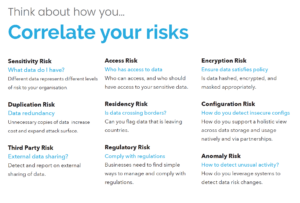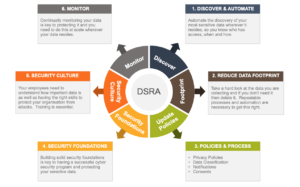Data Privacy in Australia: Safeguard Your Personal Data

Data privacy has become a critical concern for individuals and businesses in an increasingly interconnected digital world. Nowhere is this more evident than in Australia, where safeguarding online information is paramount. With cyber threats increasing and data breaches becoming more frequent, protecting sensitive data has become imperative for Australians.
In this article, we delve into the importance of data privacy in Australia and explore how individuals and businesses can safeguard their online information. From navigating the complexities of privacy regulations to implementing robust security practices, understanding the risks and taking proactive steps are critical in today's digital landscape.
At Cyooda Security, we understand the significance of data privacy and recognize the need for comprehensive protection. With our expertise in data security and privacy, we aim to provide valuable insights and practical strategies to safeguard your online information effectively. Join us as we explore the ever-evolving challenges and discover actionable ways to fortify your digital privacy in Australia.
Stay tuned for our comprehensive guide on data privacy in Australia, designed to empower you with knowledge and the tools to protect your online information.
The Legal Framework for Data Privacy in Australia
Australia boasts a robust legal framework governing data privacy, with the Privacy Act 1988 as a cornerstone statute. This legislation outlines organisations' obligations regarding the collection, use, and disclosure of personal information. Moreover, the Australian Privacy Principles (APPs) delineate specific guidelines that entities must adhere to when handling personal data. The Office of the Australian Information Commissioner (OAIC) plays a pivotal role in overseeing compliance with these regulations, underscoring the nation's commitment to upholding data privacy standards.
Amidst the evolving digital landscape, the onus is on individuals and businesses to comprehend the regulatory requirements and ensure adherence to the stipulated norms. By fostering a culture of compliance and accountability, stakeholders can reinforce the protection of personal information and mitigate the risks associated with data breaches.
Understanding the Risks of Online Data Breaches
The prevalence of online data breaches poses a grave threat to the fabric of data privacy in Australia. Cybercriminals leverage sophisticated tactics to infiltrate systems and pilfer sensitive information, thereby jeopardising the confidentiality and integrity of data. From ransomware attacks to phishing scams, the array of threats confronting individuals and organisations underscores the critical need for proactive security measures.
In light of these perils, fostering a comprehensive understanding of cyber threats is imperative. Individuals can fortify their defenses and preempt potential breaches by remaining vigilant and staying abreast of emerging risks. Through education and awareness initiatives, the populace can bolster their resilience against cyber threats and safeguard their online information effectively.
The Importance of Data Privacy for Individuals
For individuals, data privacy is not merely a matter of safeguarding personal details but a fundamental right that underscores autonomy and dignity. Our digital footprint is a treasure trove of insights that can be exploited for nefarious purposes if left unprotected. The data we entrust to online platforms, from financial information to medical records, necessitates vigilant protection to prevent misuse and abuse.
Empowering individuals to control their personal information is paramount in cultivating a secure digital environment. By embracing privacy-enhancing technologies and adopting prudent security practices, individuals can assert their agency over their data and mitigate the risks of unauthorised access. Upholding data privacy empowers individuals to navigate the digital realm with confidence and resilience.
The Importance of Data Privacy for Businesses
As custodians of vast volumes of sensitive data, businesses shoulder a profound responsibility in upholding data privacy standards. Beyond regulatory compliance, prioritising data privacy engenders trust among stakeholders and enhances brand reputation. The fallout from data breaches can be catastrophic, resulting in financial losses, legal repercussions, and reputational damage that may be irreparable.
By cultivating a culture of data stewardship and embedding privacy by design principles into their operations, businesses can fortify their resilience against cyber threats. Investing in robust cybersecurity measures and fostering a culture of vigilance among employees is critical in strengthening organizations' data privacy posture. Embracing transparency and accountability bolsters consumer confidence and underscores a commitment to ethical data practices.

Correlate you Data Risks
Steps to Safeguard Your Online Information
In an age where data is hailed as the new currency, taking proactive steps to safeguard your online information is paramount. From implementing multifactor authentication to encrypting sensitive communications, individuals can employ many strategies to bolster their digital defenses. Regularly updating security software, exercising caution when sharing personal information, and conducting privacy assessments are pivotal in fortifying one's online security posture.
For businesses, instituting data encryption protocols, conducting regular security audits, and cultivating a culture of cybersecurity awareness are critical steps in safeguarding sensitive data. By implementing data minimisation practices and limiting access to personal information on a need-to-know basis, organisations can reduce the risk of data exposure and enhance their overall security posture. Proactive mitigation measures serve as a bulwark against potential threats and fortify the resilience of individuals and businesses alike.
Data Privacy Best Practices for Businesses
Businesses seeking to fortify their data privacy defences can benefit from adhering to best practices that encapsulate industry standards and regulatory guidelines. Implementing a robust data governance framework, conducting privacy impact assessments, and appointing a dedicated data protection officer are foundational steps in fostering a culture of data privacy within organisations.

Cyooda Security - Data Security Risk Assessment
By incorporating privacy by design principles into product development processes and embracing encryption technologies, businesses can fortify their defences against cyber threats and demonstrate a commitment to data protection. Regular training programs for employees, incident response protocols, and breach notification procedures are indispensable components of a comprehensive data privacy strategy that prioritises risk mitigation and regulatory compliance.
The Role of Government and Regulatory Bodies in Data Privacy
Government entities and regulatory bodies play a pivotal role in shaping the data privacy landscape in Australia. By promulgating legislation that establishes clear guidelines for data protection and enforcing compliance through regulatory oversight, these entities foster a culture of accountability and transparency within the ecosystem. The OAIC, as the primary regulatory authority overseeing data privacy matters, guides organisations and individuals in navigating the complexities of data protection.
Collaboration between government agencies, industry stakeholders, and cybersecurity experts is instrumental in formulating policies that address emerging threats and safeguard the interests of data subjects. By fostering a collaborative ecosystem that prioritises information sharing and best practices, regulatory bodies can bolster the resilience of the digital infrastructure and enhance data privacy safeguards across diverse sectors.
Data Privacy Tools and Technologies
The proliferation of data privacy tools and technologies has ushered in a new era of defense mechanisms to fortify online information security. From virtual private networks (VPNs) to secure messaging applications, individuals can leverage tools to encrypt communications and shield their data from prying eyes. Encryption software, password managers, and biometric authentication technologies offer robust safeguards against unauthorised access and data breaches.
For businesses, investing in the right security tools to satisfy APP 11 and having the right security frameworks in place is essential to building solid foundations and ensuring compliance with the Act. By mapping where sensitive data resides and who has access to it, organisations can bolster their resilience against cyber threats and safeguard their data assets effectively. Cyooda Security has a range of services and solutions that can help here, and our Data Security and Privacy Solutions Guide is your first step in understanding this.
Conclusion: Taking Control of Your Online Data Privacy in Australia
As the digital landscape continues to evolve, the imperative of safeguarding online information in Australia grows increasingly pronounced. By understanding the legal framework governing data privacy, recognizing the risks of online data breaches, and implementing proactive measures to fortify security defenses, individuals and businesses can navigate the complexities of the digital realm with confidence and resilience.
Empowering oneself with knowledge, embracing best practices, and leveraging cutting-edge technologies are pivotal steps in taking control of one's online data privacy. By championing a culture of data stewardship, promoting transparency, and upholding the ethical principles of confidentiality, Australians can fortify their digital defenses and safeguard their online information effectively. Let us embark on this journey together, armed with insights and strategies to protect our digital footprint and preserve the sanctity of data privacy in Australia.